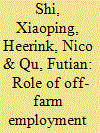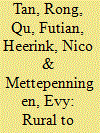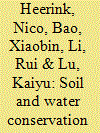|
|
|
Sort Order |
|
|
|
Items / Page
|
|
|
|
|
|
|
| Srl | Item |
| 1 |
ID:
110500


|
|
|
|
|
| Publication |
2011.
|
| Summary/Abstract |
This study examines the conventional wisdom that off-farm employment contributes to environmental pollution by increasing the use of agro-chemicals. In order to analyse the role of household decision making and village factor markets in more detail, we run simulations with a hybrid farm household/village computable general equilibrium model that is applied to a village in Northeast Jiangxi Province. We find that the negative lost-labour effect of off-farm employment on agricultural incomes is much stronger than the (small) positive income effect. As a result of reduced labour resources and increased leisure consumption, farm households reduce the intensity of rice cultivation as well as the production of (especially) cash crops. The shift in production activities is stronger for migration than for off-farm employment, because migrants cannot combine off-farm work with onfarm work, and because migration reduces the village market price of oxen services. The shift towards less intensive rice production means that off-farm employment (and migration in particular) reduces the levels of chemical inputs and manure used in agricultural production. The decline in fertilizer input is much larger than the decline in manure use, because manure is a nontradable commodity and is applied only once per year. We therefore conclude that migration and, to a lesser extent, local off-farm employment lead to lower incomes from agricultural production, but have benign effects on environmental quality.
|
|
|
|
|
|
|
|
|
|
|
|
|
|
|
|
| 2 |
ID:
119791


|
|
|
|
|
| Publication |
2013.
|
| Summary/Abstract |
Reducing the climate impact of rural household energy consumption in China is complicated since it is bound up with deeply routinized daily practices and dependent from existing infrastructural systems of energy supply. To assess the potential for low carbon development we first estimate the overall CO2 emissions of rural households, followed by a more in depth description and characterization of the different energy use practices within the households. Space heating turns out to be the largest emission source among domestic energy practices in north China. We present lifestyle and context related factors that help to explain existing differences in domestic energy use practices of households. The potential for low carbon development is discussed both at the demand side and the supply side. At the demand side, the use of more efficient technologies and cleaner energy sources for space heating seems to be a high potential measure for achieving low carbon households. At the supply side the reduction of rural domestic CO2 emissions could be effectively supported by making available to householders renewable and cleaner energy sources and technologies. In order to be effective, such low carbon energy options should take into account the (income) characteristics and lifestyles of rural householders.
|
|
|
|
|
|
|
|
|
|
|
|
|
|
|
|
| 3 |
ID:
147427


|
|
|
|
|
| Summary/Abstract |
Land disputes have been an important risk to social stability in China since the turn of the century. This paper uses provincial data on illegal land uses during the period 1999–2010 as a proxy for the intensity of land conflicts to investigate the effects of foreign direct investment (FDI) and fiscal decentralization on jurisdictional land conflicts. The results show that the FDI growth rate has a positive and significant impact on the growth rate of illegal land use when there is a high degree of fiscal decentralization. We thus provide evidence supporting the hypothesis that regional competition for FDI, as shaped by fiscal decentralization, tends to raise conflicts over land in China.
|
|
|
|
|
|
|
|
|
|
|
|
|
|
|
|
| 4 |
ID:
101160


|
|
|
|
|
| Publication |
2010.
|
| Summary/Abstract |
This paper performs a plot-level analysis of the impact of land rental market participation and off-farm employment on land investment, input use, and rice yields for 215 plots cultivated by 52 households in three villages in Northeast Jiangxi Province. Our findings show that households that rent extra land are relatively more productive, but contradict results of earlier studies which found that tenure status of plots affects the level of land investments. We further find that off-farm employment does not significantly affect rice yields. This result contradicts those of earlier studies which found that the negative lost-labor effect of off-farm employment dominates the positive income effect. Another novel finding is that people working locally off-farm tend to switch from green manure planting towards the use of organic manure on their rice plots. We conclude that policies that will further stimulate the development of land rental markets, which is still in its infancy, can contribute significantly to higher rice production in Southeast China. Another implication of our results is that worries about the negative impact that the continuously growing off-farm employment may have on China's goal to remain self-sufficient in grain production are less relevant at the moment for the region examined in our study.
|
|
|
|
|
|
|
|
|
|
|
|
|
|
|
|
| 5 |
ID:
089579


|
|
|
|
|
| Publication |
2009.
|
| Summary/Abstract |
Energy consumption in rural areas in China is characterized by high consumption of fuelwood, straw and other biomass. Off-farm employment can play an important role in the transition towards more sustainable sources of energy by increasing rural household incomes and reducing the amount of labor available for biomass collection. The purpose of this paper is to examine the impact of off-farm employment on rural household energy consumption choices, and to disentangle the various causal relationships that play a role in this respect. To this end, a hybrid farm household/village computable general equilibrium (CGE) model is used that has been calibrated for a remote village in Northeast Jiangxi Province where fuelwood is the main source of energy. The model takes into account nonseparability of farm household production and consumption decisions as well as linkages within the village between households involved in off-farm employment and households with no members working off-farm. Contrary to previous research for a richer region in rural China, we find that fuelwood is not an inferior good. The positive impact of more food consumption on fuelwood collection more than compensates the higher leisure demand associated with higher incomes. Shifts in production activities and in prices on village factor markets caused by increased labour scarcity (the lost-labour effect of off-farm employment), on the other hand, cause a reduction in fuelwood collection and consumption. This lost-labour effect is much stronger for migration than for local off-farm employment, because the latter can more easily be combined with on-farm work and fuelwood collection. For local off-farm employment the income effect dominates the lost-labour effect, resulting in a positive overall impact of higher off-farm participation on fuelwood consumption. For migration, on the other hand, the income effect and the lost-labour effect are almost equal in size. Hence, the amount of fuelwood collected and consumed does not change much when households participate in migration. The final conclusion is therefore that increased off-farm employment opportunities do not promote the transition of rural energy use in the poorer regions of rural China.
|
|
|
|
|
|
|
|
|
|
|
|
|
|
|
|
| 6 |
ID:
110496


|
|
|
|
|
| Publication |
2011.
|
| Summary/Abstract |
The current system of converting farmland to urban land use in China can be characterized as a hybrid system that combines government controls with market-based transfers. In this paper we argue that this hybrid governance structure causes an over-conversion of farmland from the rural to the urban sector, as compared to a competitive market situation, and a welfare reallocation that discriminates against farmland owners. We develop a partial equilibrium model that can be used to examine the impact of the current hybrid governance structure on the over-conversion of farmland and to analyze the welfare changes for different groups of actors and the resulting net social welfare loss. Using a dataset with detailed information on farmland acquisitions and urban land transactions in Yingtan City in Jiangxi Province, we illustrate how this framework can be applied. Our results indicate an over-conversion of 33.5% of the total converted farmland in this city between 1999 and 2003. The welfare of farmland owners affected by the conversion decreased by 1.38 billion RMB, while the net social welfare loss equaled more than 270 million RMB during the same period. The local government obtained 380 million RMB of revenues by re-selling farmland as urban land through competitive conveyance mechanisms between 2002 and 2005, while the manufacturing sector gained an estimated 280 million RMB from buying land use rights at relatively low prices. We conclude that the current policy of increasing urban land conveyance through competitive mechanisms does not address two major underlying causes of over-conversion, and that protection of farmland would be better served by replacing the current hybrid rural to urban land market structure by a competitive land market.
|
|
|
|
|
|
|
|
|
|
|
|
|
|
|
|
| 7 |
ID:
089563


|
|
|
|
|
| Publication |
2009.
|
| Summary/Abstract |
This study uses a unique set of annual provincial data on soil and water conservation (SWC) investments during the period 1989-2005 to estimate the impact of such investments on the extent and severity of erosion, the growth rate of agricultural gross domestic product (GDP) and rural poverty reduction in China. We find that SWC investments made by local governments have a significant negative impact on the extent of erosion and (in recent years) the severity of erosion, whereas SWC investments made by farm households until recently had a significant negative effect on the severity of erosion. In its turn, the severity of erosion is found to have a significant negative impact on agricultural GDP. Estimation of the impact of the extent of erosion on agricultural GDP provides mixed results. Based on these results, we derive that one RMB invested in SWC by local governments increases agricultural GDP in 2002 with 0.84-1.25 RMB. Finally, we find that agricultural GDP has a significant negative impact on the rural poverty rate. The resulting indirect effect of SWC investment on rural poverty reduction, however, is small compared to other types of public investment. We conclude that (local) government investments in SWC do not only serve environmental goals, but also make a non-negligible contribution to agricultural growth and rural poverty reduction.
|
|
|
|
|
|
|
|
|
|
|
|
|
|
|
|
| 8 |
ID:
110494


|
|
|
|
|
| Publication |
2011.
|
| Summary/Abstract |
In this paper we provide an overview of recent trends in the availability and quality of land and water resources in rural China, and examine the common presumption that rural resources are rapidly degrading in China. Data based on consistent definitions and measurement methods that have recently become available are used to that end. In addition, we analyse the impact of new policy initiatives to introduce market-based instruments and new institutions to address land degradation and water scarcity problems.
We find that the decline in cultivated area has accelerated in the beginning of the new century. Ecological recovery programs, not urbanization and industrialization, are the major factors causing this decline. Ecological recovery programs are also a major force behind the increase in forest land area and the reduction of water erosion. Modest successes can be observed in the protection of wetlands and (until the mid-1980s) for the average quality of cultivated land. On the other hand, degradation of natural grassland and wind erosion have become much more severe in recent decades.
In northern China, particularly in the 3-H (Hai and Luan, Huai and Huang) river basins, the availability of water has tightened. Groundwater tables have fallen considerably in the Hai river basin, because farmers increasingly rely on groundwater for irrigation. Evidence on other parts of northern China is mixed. Pollution of surface water is getting worse since the beginning of the 1990s in two major lakes in southern China and until recently in the rivers in northern China. Water quality problems in the larger rivers in southern China are less severe and getting less. These problems are to a large extent caused by agriculture-based non-point source pollution, especially in the major lakes and reservoirs.
The sloping land conversion program, water pricing, and the establishment of water user associations and payments for environmental service projects are used as cases to examine the introduction of market-based instruments and new institutions. We argue that less government interference in the implementation of these instruments and institutions is likely to enhance ecological as well the economic benefits. Moreover, supportive measures to improve the functioning of land and labor markets are usually needed to ensure the sustainability of the impact of interventions.
|
|
|
|
|
|
|
|
|
|
|
|
|
|
|
|
|
|
|
|
|